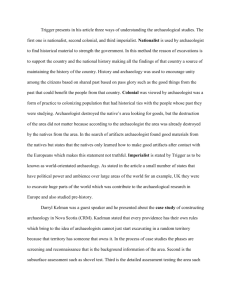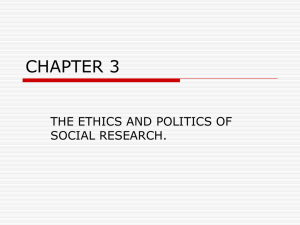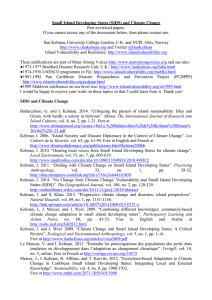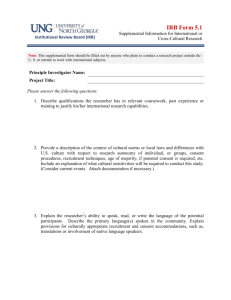Final - Polished Paper
advertisement
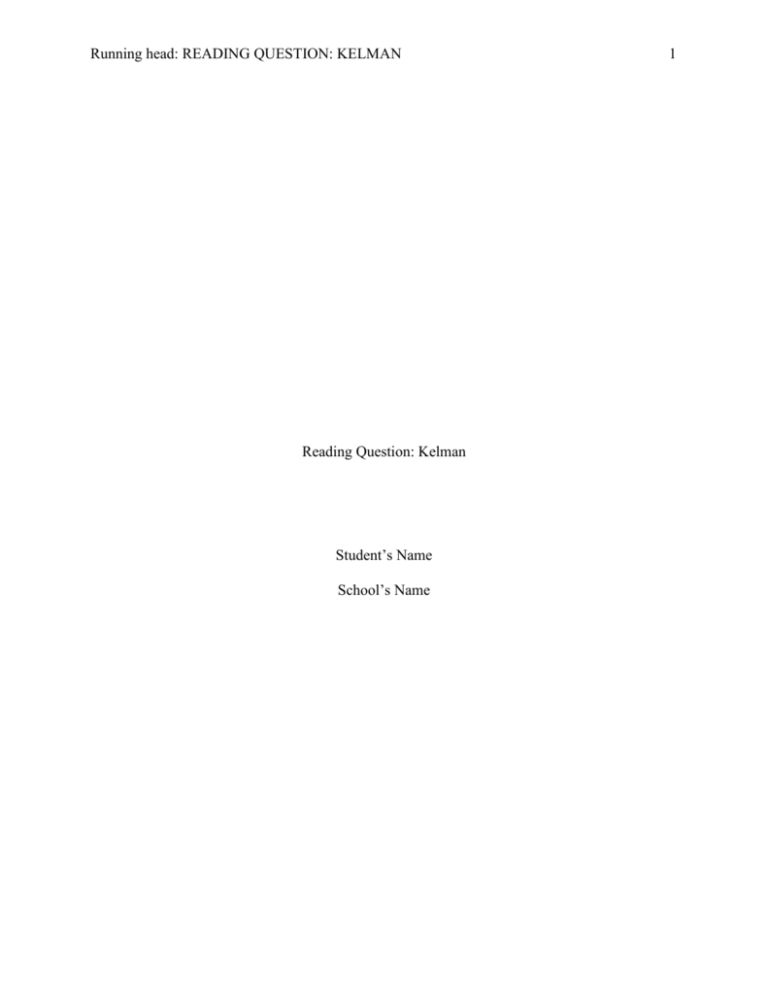
Running head: READING QUESTION: KELMAN Reading Question: Kelman Student’s Name School’s Name 1 READING QUESTION: KELMAN 2 Reading Question: Kelman I learned in my Introduction to Psychological Research class that the code of ethics the Institutional Review Board (IRB) uses for psychologists looking to conduct a research study involving human subjects states that a researcher must closely guard participants’ welfare. Along with protecting research participants’ welfare, the IRB also requires that all participants be fit to give consent. The researcher must provide all information regarding the study’s purpose and potential risks to the participants prior to conducting the study. The researcher must also sufficiently debrief participants at the conclusion of the study. This is relevant because for much of what social psychologists want to study, they need to maintain some secrecy from participants. Participants’ knowing too much about a study could taint the results and observations the researcher collects as data. Participants could consciously or unconsciously skew results through self-fulfilling prophecies, the placebo effect, or a desire to gain the researcher’s approval (i.e., modifying behaviors in a way counter to their natural inclinations). However, Herbert C. Kelman, a social psychologist questioned the necessity of this practice and highlighted the potential adverse effects such secrecy could have on the field of psychology and on the participants themselves. Kelman (insert year) identified three main concerns with researchers’ use of deceit: 1) the underlying ethics, 2) the belief that deceit is becoming engrained into research not out of necessity but habit, and 3) the negative impact this practice could have as society (i.e., social psychologists’ study participants) becomes more aware of the deceit psychology researchers use. Kelman asserted that such public awareness could negatively affect the public’s image of psychologists and ultimately the reliability of any data they collect during their research. Kelman illustrated his concern through using well-known studies from the past as evidence. READING QUESTION: KELMAN 3 With the combination of my knowledge of the basic ethical guidelines the IRB established along with Kelman’s argument against using deceit in social psychology studies, I asked myself the following question: “Would I approve of Milgram’s study on obedience?” I would. What would be an alternative method? If Milgram and his team had been completely forthcoming with the participants they observed in their obedience study to see whether Nazi soldiers were truly evil or just following orders, would that have yielded reliable results? I would say no. Who wants to discover about themselves and share with others the truth that Hitler could have convinced them to help eradicate millions of people? The information that the study concerned blind obedience of a murderous tyrant would make participants modify their conduct to give others the best impression of themselves as possible. Milgram did not inflict harm on the participants through his study design. At worst, the design hurt their egos. Social psychologists’ job is to understand human behavior and, particularly, the ways in which society influences that behavior. Milgram’s study design was perfect in the sense that it reproduced real-world conditions in which people could choose to inflict harm on others through the influence of a charismatic leader. Either way, people will view the results as offensive or find some way to deny the reliability of the study’s conclusions because of the lack of hard evidence showing how the average citizen could fall into the trap of being convinced to intentionally inflict harm on others. Should members of society remain ill-informed on the true nature of humanity to maintain the false belief many have of themselves as being perfect? In this particular study, the knowledge gained is more important than coddling egos. I agree with Kelman on some issues, such as the Mulder and Stemerding study. This is because that study caused serious harm to participants’ livelihoods, which is about as far as my ethical concerns for the use of deceit goes. As long as READING QUESTION: KELMAN 4 participants are adequately warned about the risks of the study prior to consenting and are debriefed after the study is complete, the use of deceit is appropriate when honesty could skew the results. I am a strong advocate for Aaron T. Beck’s cognitive behavioral therapy and challenging clients’ distorted thoughts, so I would utilize that method and thoroughly explain the importance of the study and the reason accurately replicating the situation is necessary. I would also sincerely assure the participants that I as a researcher had no ill intentions when I withheld certain details about the study.


